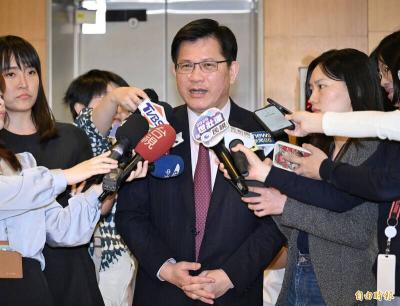Building a “consensus of the Taiwanese” is crucial for Taiwan to engage China with confidence, but Democratic Progressive Party (DPP) Chairperson Tsai Ing-wen’s (蔡英文) “Taiwan consensus” is questionable for its “emptiness,” academics said yesterday.
“A consensus among Taiwanese is important so that Taiwan can negotiate with China with a ‘shared’ position. However, that would be a difficult goal given that national identity has been Taiwan’s ‘Achilles’ heel,’” Chao Chun-shan (趙春山), a political scientist at Tamkang University, told a seminar organized by the Taiwan Competitiveness Forum.
The seminar aimed to discuss the possibility of a “consensus of the Taiwanese,” which would be a combination of the so-called “1992 consensus” and the “Taiwan consensus,” the central theme of a recent war of words between the DPP and the Chinese Nationalist Party (KMT).
Tsai, the DPP’s presidential candidate, has tried to replace the “1992 consensus” with the “Taiwan consensus,” which Chao described as “an empty initiative that no one understands,” adding that she has so far failed to convince people the DPP can come up with a better solution, he said.
Beijing will not accept Tsai’s initiative, which emphasizes a democratic process involving all parties within Taiwanese society, because her China policy has always been somewhere between “a special state-to-state relationship,” a phrase coined by former president Lee Teng-hui (李登輝), and former president Chen Shui-bian’s (陳水扁) “one country on each side,” said Chang Ya-chung (張亞中), a professor at National Taiwan University who advocates eventual unification based on a “one China, three constitutions” initiative.
Hwang Kwang-kuo (黃光國), a professor at the same school and a unification supporter, said while internal divisions did not serve Taiwan’s national interest, the January presidential election was bound to be “a duel between two consensuses.”
The “1992 consensus” that President Ma Ying-jeou (馬英九) has been espousing would provide Taiwan with flexibility for future engagement, Hwang said.
He said the DPP would need to review its China policy if it lost the election.
There could be some adjustment for the KMT to make as well even if Ma is re-elected, said Chang Wu-yueh (張五岳) of Tamkang University.
Ma is unlikely to receive the same strong mandate as he did in 2008 and the KMT is expected to lose some seats in the legislature, which means the ruling party would not be able to dominate cross-strait engagement and would have to make concessions, he said.
“However, it is an open secret that there has been no dialogue between the two major political parties at all during the past three years,” Chang said.
The discussion of the “1992 consensus” is not meaningful as the true important matter was the “2008 consensus” reached by Ma and China after his landslide victory, Taiwan Thinktank consultant Chang Kuo-cheng (張國城) said.
The real question for the DPP is whether it accepts the “2008 consensus,” which represents the position of “anti-Taiwan independence and de facto one China,” he said.
Regardless of how difficult it would be, political parties in Taiwan should keep looking for common ideas to build a consensus, said Thomas Peng (彭錦鵬), a National Taiwan University political scientist.
“In my opinion, the common values could include the Republic of China [ROC], the ROC Constitution, a ‘Taiwan first’ mentality and ‘one China with different interpretations,’” Peng said.

Taiwan would welcome the return of Honduras as a diplomatic ally if its next president decides to make such a move, Minister of Foreign Affairs Lin Chia-lung (林佳龍) said yesterday. “Of course, we would welcome Honduras if they want to restore diplomatic ties with Taiwan after their elections,” Lin said at a meeting of the legislature’s Foreign Affairs and National Defense Committee, when asked to comment on statements made by two of the three Honduran presidential candidates during the presidential campaign in the Central American country. Taiwan is paying close attention to the region as a whole in the wake of a

Chinese Nationalist Party (KMT) Chairman Eric Chu (朱立倫), spokeswoman Yang Chih-yu (楊智伃) and Legislator Hsieh Lung-chieh (謝龍介) would be summoned by police for questioning for leading an illegal assembly on Thursday evening last week, Minister of the Interior Liu Shyh-fang (劉世芳) said today. The three KMT officials led an assembly outside the Taipei City Prosecutors’ Office, a restricted area where public assembly is not allowed, protesting the questioning of several KMT staff and searches of KMT headquarters and offices in a recall petition forgery case. Chu, Yang and Hsieh are all suspected of contravening the Assembly and Parade Act (集會遊行法) by holding

President William Lai (賴清德) has appointed former vice president Chen Chien-jen (陳建仁) to attend the late Pope Francis’ funeral at the Vatican City on Saturday on his behalf, the Ministry of Foreign Affairs said today. The Holy See announced Francis’ funeral would take place on Saturday at 10am in St Peter’s Square. The ministry expressed condolences over Francis’ passing and said that Chen would represent Taiwan at the funeral and offer condolences in person. Taiwan and the Vatican have a long-standing and close diplomatic relationship, the ministry said. Both sides agreed to have Chen represent Taiwan at the funeral, given his Catholic identity and

Taiwan would welcome the return of Honduras as a diplomatic ally if the next president of that country decides to make such a move, Minister of Foreign Affairs Lin Chia-lung (林佳龍) said today. “We would welcome Honduras if they want to restore diplomatic ties with Taiwan after their elections,” Lin said during a legislative hearing. At the same time, Taiwan is paying close attention to the Central American region as a whole, in the wake of a visit there earlier this year by US Secretary of State Marco Rubio, Lin said. Rubio visited Panama, El Salvador, Costa Rica and Guatemala, during which he